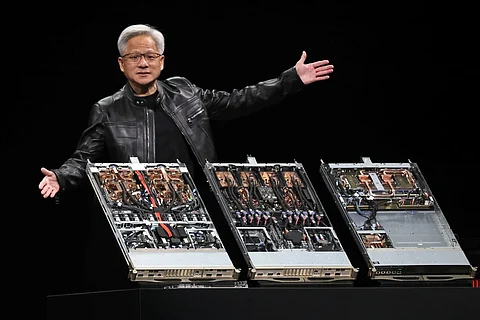

Within a decade, the world’s factories will run largely on robots and artificial intelligence (AI), replacing humans in repetitive and hazardous tasks, according to Nvidia CEO Jensen Huang. Speaking at the opening of the International Supply Chain Expo in Beijing on Wednesday, Huang hailed AI as the new industrial infrastructure, comparable to electricity and the internet.
“AI is revolutionising the supply chain, changing how we build and move things,” said Huang. “Hundreds of projects in China are already simulating digital twins in Nvidia’s Omniverse to optimise factories and warehouses.”
Huang’s visit coincides with the US government's greenlight for Nvidia to resume exports of its China-specific H20 chip, a less powerful version of its high-end AI accelerators. The move opens the door to one of the world’s fastest-growing AI markets, where investment is expected to jump 48 percent this year to $98 billion.
Nvidia, now the world’s first $4 trillion company, also announced plans to release a new RTX PRO GPU tailored for smart factories and logistics in China. The return of Nvidia chips is a significant boost for Chinese developers of large language models (LLMs), such as DeepSeek, MiniMax, Baidu, Alibaba’s Qwen, and Moonshot AI’s Kimi.
Huang praised China’s AI ecosystem, citing its “super fast innovation” and the efforts of over 1.5 million developers using Nvidia tools. He described China’s open source AI development as a “catalyst for global progress”, offering industries worldwide a chance to join the AI revolution.
However, Huang also expressed concern over the growing exodus of Chinese researchers from the US. “It’s a great loss for America when the brightest minds decide to go home,” he said. “I’m happy they go home—that’s where they’re from—but it’s an enormous loss for the US.”
Huang, who emigrated from Taiwan to the US with his family, reflected on his own success story. “Because of the United States and all of my colleagues and the dream that we had, we created a very nice company,” he said.
He noted that China’s “vibrant” market and growing entrepreneurial energy are attracting top talent back from overseas. Notable returnees include mathematician Yitang Zhang and battery scientist Zhou Jianbin.
Calling for stronger international cooperation, Huang said it was “extremely important” for China and the US to work together on AI. “This technology is so powerful that we must share ideas not just on advancement but also on how to keep it safe,” he said, advocating for transparency through open source development.
“We have a lot of competition, so we have to work hard,” Huang added, noting the rapid progress of China’s semiconductor and AI sectors.